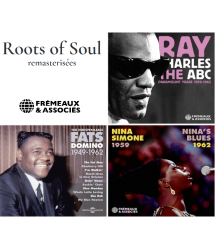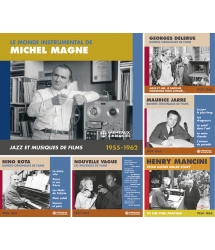-
« De belles faces en compagnie de jeunes boppers » par Jazz Mag
Catégories : Article de presse ( Article de presse )On retrouve Charlie Parker avec Coleman Hawkins à l’occasion du tournage du second Jammin’ the Blues en septembre 1950 pour le quitter au Birdland où il se produit « with strings », le 7 avril 1951, laissant pour le prochain volume le prometteur concert du 31 mars au même endroit avec Bud Powell et Dizzy Gillespie. Entre-temps, on sera passé par le Pershing Ballroom de Chicago (avec un orchestre local) et par la Suède où il laisse de belles faces en compagnie de jeunes boppers tout à fait prêts à relayer son message (dont Rolf Ericson tout juste rentré des Etats-Unis). Remarquons parmi ces faces live recueillies par les labels Oktav et Sonet une brève version de Lover Man qui nous fait oublier le drame de 1946 sur la Côte Ouest et un splendide Cool Blues. La route du retour passe par Paris où il est capté à la radio sur Lady Bird en grand orchestre. Le 9 décembre, il retrouve Red Rodney, Kenny Drew, Curley Russell et Art Blakey au Birdland et là… ça barde, la prise de son aussi hé [...]
-
« Des auditoires captivés par une voix pleine d’ardeur et de majesté » par Jazzm
Catégories : Article de presse ( Article de presse )Mahalia est devenue une artiste d’envergure mondiale quand elle entreprend au printemps 1961 sa première tournée en Europe depuis neuf ans. A l’avenir, ses grandes consoeurs, de Rosetta Tharpe à Marion Williams, ne chanteront plus tout à fait sur le même plan qu’elle, faute de baigner dans la même lumière. Dans cette sélection de 14 faces en public à Stockholm et Paris, les spirituals de veines diverses voisinent avec des gospel songs adoptés depuis peu par la chanteuse, des reprises de sa période Apollo et un occasionnel standard de Broadway. Devant des auditoires captivés par cette voix pleine d’ardeur et de majesté, ce phrasé aux irrésistibles mélismes, Mahalia installe son climat et engage son corps, jouant de son souffle et frappant dans ses mains au creux du tempo, suivie ou devancée par le piano Mildred Falls. On a ici deux belles versions d’ « Elijah Rock », mais celle de Stockholm atteint au grandiose par son lyrisme en partie contenu. Le découpage mélodique de « Down By [...]
-
“A fascinating release” by Blues & Rhythm
Catégories : Article de presse ( Article de presse )“Frémeaux FA 5479 (Three CDs: 65:00/ 61:44/ 55:37) Note first that this is “Rock In French”, not “In France” as the third CD consists of rock and roll recordings from Quebec in Canada. As the notes point out, the music on the first two CDs is from France itself, pre-Johnny Hallyday, the French rock and roll pioneer, and tends to consist of performances by jazzers, big band musicians, and pop artists, jumping onto another fad like mambo and calypso… But that is not to say this is a waste of time – quite the opposite. Édith Piaf may not appeal to non-French speakers with her relatively well-known ‘L’Homme À La Moto’ (a cover of Leiber & Stoller’s ‘Black Denim Trousers And Motorcycle Boots’) - it is most definitely Édith Piaf. However, some of the other tracks have more in common with Bill Haley in particular - the set opens with Jacques Hélian’s version of ‘Rock Around The Clock’ from 1956 and Mac-Kac’s reworking of ‘See You Later Alligator’ - rather than Elvis Presley, who only re [...]
-
“The major figures in the blues scene” by Blues in the south
Catégories : Article de presse ( Article de presse )“This double CD set is subtitled “Political and Social Blues against Racism at the Origin Of The Civil Rights Movement” and contains plenty of relatively hard-hitting numbers, mainly from commercially released 78s, by many of the major figures in the blues scene during those years: Big Bill Broonzy, Josh White, Brownie McGhee, Tampa Red, Lonnie Johnson, Bessie Smith, Big Joe Williams, Lowell Fulson, Champion Jack Dupree, John Lee “Sonny Boy” Williamson, John Lee Hooker, Charles Brown, Memphis Slim and others. Some – though for obvious reasons not many - deal with racism overtly, others with the pernicious effects of discrimination and poverty. All have something to say, and for those who wonder about the inclusion of songs on natural disasters, just think about how New Orleans was treated in the wake of Hurricane Katrina. The booklet too outlines the route from supposed “separate but equal facilities” to Barack Obama in The White House, focusing on topical events and relating them [...]
-
« Irrésistible » par L’Alsace
Catégories : Article de presse ( Article de presse )« Claude Bolling Une anthologie de 3 CD réunit les musiques de films, connues ou méconnues, signées par ce grand baroudeur du jazz. De Borsalino à Flic Story via La Ballade des Dalton, la somme est édifiante, exaltante et irrésistible. »Par Thierry BOILLOT – L’ALSACE
-
« L’album plaira, à coup sûr ! » par Jazzmag
Catégories : Article de presse ( Article de presse )Le programme, de Chopin à Piazzola « Oblivion », de Carl Emmanuel Bach à Jaco Pastorius « Teresa » en passant par la « Waltz for Debby » de Bill Evans, sans oublier quelques compositions originales, procède d’un éclectisme révélateur. Marcel Loeffler évolue avec aisance dans plusieurs univers. Il se trouve à l’aise partout, aussi bien dans la valse dont on sait qu’elle est une des prédilections, sinon la marque distinctive du musette, que dans « Solfegietto », pièce que signa l’un des fils du Cantor et où la virtuosité de l’instrumentiste se donne libre cours. Virtuosité, lyrisme, imagination, cet album en regorge. Avec le swing caractéristique de la musique manouche et une légèreté propre à l’accordéoniste dont l’admiration pour Gus Viseur s’est concrétisée dans un précédent disque au titre explicite. « Around Gus ». Son fils Cédric à la guitare rythmique, également auteur inspiré d’une ballade, Railo, et Engé Helmsletter, qui se partagent les soli de guitare, lui offrent, avec l [...]
-
« Son inspiration s’abreuve à plusieurs sources » par Jazzmag
Catégories : Article de presse ( Article de presse )Bien connu des amateurs de jazz manouche pour ses prestations dans les clubs parisiens et ses enregistrements, notamment avec Angelo Debarre, le violoniste et chanteur Daniel John Martin montre, à travers sa large palette d’auteur-compositeur-interprète, qu’il n’est pas seulement un épigone de Django, mais que son inspiration s’abreuve à plusieurs sources. Dans son quintette, le guitariste Gilles Réa est l’auteur de soli séduisants.Par J.A.. - JAZZMAG
-
« L’âge d’or du flamenco enregistré » Par Jazzmag
Catégories : Article de presse ( Article de presse )Dans cette anthologie de l’âge d’or du flamenco enregistré, on retrouve une bonne partie du coffret LP 25 cm « Antologia Del Cante Flamenco » que l’actrice Beverly Bentley offrit en 1959 à son amant Miles Davis. S’y trouve précisément les « saetas » chantées par Roque Montoya et Lolita Triana que Gil Evans transcrivit pour Miles sous le titre « Saeta » sur « Sketches Of Spain ».Par F.B. – JAZZMAG










